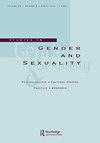“如果不是因为韩剧,我早就和丈夫离婚了”——越南女性对电视浪漫和忧郁症的消费
Q3 Social Sciences
引用次数: 3
摘要
摘要本文借鉴弗洛伊德的忧郁症概念,以及英和韩对这一概念的当代处理方法,探讨越南已婚女性如何消费浪漫的韩国电视剧,以应对未被承认和未解决的损失,或忧郁症的心理状况。通过对一名女性研究参与者的忧郁症个案研究和对越南女性婚姻生活的讨论,文章提出了两个论点。首先,对于越南已婚女性来说,浪漫消费可能是一种私人方式,因为社会过于强调她们应对忧郁症的家庭责任,她们的自由受到限制。其次,大众浪漫文化作为一种忧郁的类型,允许已婚女性集体哀悼失去的情感,如年轻和恋爱的感觉。本文运用弗洛伊德的忧郁症和韩对忧郁症概念的当代研究方法,对忧郁症的实证研究做出了理论贡献。它还通过将这一概念应用于当代越南背景下已婚女性的心理生活,丰富了学术界对忧郁症的理解。本文章由计算机程序翻译,如有差异,请以英文原文为准。
“I’d Have Divorced My Husband If Not for Korean Dramas” – Vietnamese Women’s Consumption of Television Romance and Melancholia
ABSTRACT Drawing on the Freudian concept of melancholia and David L. Eng and Shinhee Han’s contemporary approach to the concept, this article discusses how Vietnamese married women consume romantic South Korean television dramas as a means to deal with unacknowledged and unresolved loss, or the psychic condition of melancholia. Through a case study of melancholia in a female research participant and a discussion of Vietnamese women’s marital lives, the article proposes two arguments. First, romantic consumption can be a private way for Vietnamese married women suffering from restricted freedom due to societal overemphasis on their familial duties to cope with melancholia. Second, the mass romantic culture, as a melancholic genre, allows married women to collectively mourn lost emotions such as the feeling of being young and being in love. The article makes a theoretical contribution by utilising Freud’s melancholia and Eng and Han’s contemporary approach to the concept for its empirical research. It also enriches an academic understanding of melancholia through its application of the concept to married women’s psychic lives within a contemporary Vietnamese context.
求助全文
通过发布文献求助,成功后即可免费获取论文全文。
去求助
来源期刊

Studies in Gender and Sexuality
Social Sciences-Gender Studies
CiteScore
0.80
自引率
0.00%
发文量
15
期刊介绍:
Beginning in the final two decades of the 20th century, the study of gender and sexuality has been revived from a variety of directions: the traditions of feminist scholarship, postclassical and postmodern psychoanalytic theory, developmental research, and cultural studies have all contributed to renewed fascination with those powerfully formative aspects of subjectivity that fall within the rubric of "gender" and "sexuality." Clinicians, for their part, have returned to gender and sexuality with heightened sensitivity to the role of these constructs in the treatment situation, including the richly variegated ways in which assumptions about gender and sexuality enter into our understandings of "normality" and "pathology."
 求助内容:
求助内容: 应助结果提醒方式:
应助结果提醒方式:


